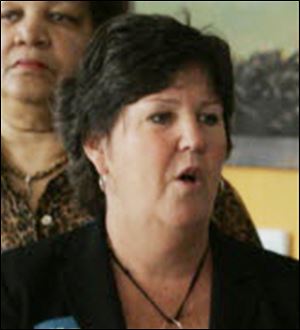
Lucas County moves '2nd chance' clinic so it can take more clients
7/14/2009
County Commissioner Tina Skeldon Wozniak says the expungement program allows people to become productive.
Lucas County Commissioner Tina Skeldon Wozniak announced yesterday the county is providing a new location for the bar association's free legal clinic that helps low-income people expunge minor criminal records.
Second Chance Tuesdays will convene from 1 to 2 p.m. the second Tuesday of the month beginning today at The Source, 1301 Monroe St., in downtown Toledo. The program is set up for walk-ins.
Attorneys from the Toledo Bar Association's Pro Bono Legal Services Program will guide individuals through the process of sealing criminal case records so they don't remain a life sentence to unemployment, Ms. Wozniak said.
State law allows those convicted of generally one nonviolent offense to expunge their criminal record.
Once a judge grants an expungement, the individual may respond to job applications and interviewers as if his or her conviction never happened.
"The law allows people to make a minor past mistake and move on," Ms. Wozniak said at a news conference. "It allows people to move forward in life. If people can't move forward from mistakes and be productive, it's more costly to society."
Ms. Wozniak also said that given the recession and labor market, having a blemish-free criminal record is as valuable as ever for job seekers. Unemployment in Lucas County reached 13.4 percent in May.
So far this year, at least 87 people have received expungements from Lucas County Common Pleas Court, a court official said. Numbers for Toledo Municipal Court were not immediately available.
The bar association moved its three-month-old expungement clinic to The Source, the county's work-force development agency, to expand the number of clients. While the association has long provided pro bono services for expungements, it only recently began the formal clinic, said Pat Intagliata, director of the pro bono program.
Convictions that cannot be sealed include, among certain others, first and second-degree felonies, sex crimes, traffic violations, offenses involving a firearm, or a felony or first-degree misdemeanor with a victim under age 18.
Individuals must also wait at least one year after a misdemeanor case is closed or three years for a felony case.
A $50 filing fee is also required to the court.
The pro bono clinic is open to those whose incomes are no more than 125 percent above federal poverty line. Under those guidelines, a single individual cannot earn more than $13,538 a year.
Attorney James Yavorcik, the bar's association's president, noted that attorneys can help an applicant apply for an expungement but can't ensure whether the person's criminal case files will be sealed.
"Ultimately it's up to the judge whether any of these applicants are granted expungements," Mr. Yavorcik said.
Contact JC Reindl at:
jreindl@theblade.com
or 419-724-6065.